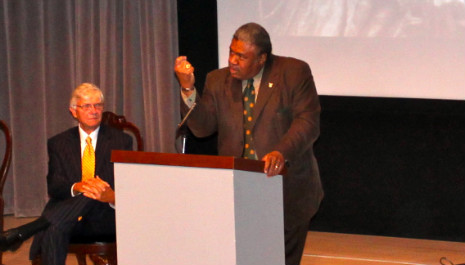Former Va. Justice to Speak at Law School's Graduation
The Law School ceremony, which will be held at Lake Matoaka Amphitheatre, begins at 2:30 p.m. Degrees will be awarded to approximately 240 students in the J.D. and LL.M. programs. Seating will be limited to graduates and their guests.
2011-12 Student Bar Association President Jay Sinha '12 said that his classmates asked Thomas to speak because of his dedication to public service and added that the former justice gave a memorable speech at his class's first-year orientation. "Justice Thomas is the epitome of the citizen lawyer we all aspire to be," Sinha said. "He serves his community in a way unlike any other civic leader we've encountered. His strong words on our first day of classes still resonate with us, and we were fortunate that he was willing to bring our law school experience to a close."
Thomas received a B.A. (with distinction) in 1972 and a J.D. in 1975 from the University of Virginia. He was a partner at Hunton & Williams when he was appointed to the Supreme Court of Virginia. At age 32, he was the youngest person ever to serve on the court and the court's first African-American justice. He ruled on thousands of appellate matters during his nearly seven-year tenure.
After stepping down from the bench, Thomas returned to practice at Hunton & Williams, where he is chief of the appellate practice group. He is a member of the College of William & Mary's Board of Visitors, vice chair of the board of the Virginia Capitol Foundation, and a trustee of the Thomas Jefferson Foundation, which is dedicated to the preservation of Monticello and its educational mission.
In 2009, in his remarks to the class during their 1L orientation, Thomas shared what he learned about the law in his almost forty years of study and practice.
"The law is about the struggle of people to be free," he said. He stressed that the law is shaped by the intentions of those who practice it, and urged the class to use what they would learn during law school to advance the causes of justice and equality.
"If you bring hate to the law, the law is going to be a tool for hatred," Thomas said. "If you bring violence to the law, the law is going to be a tool for violence. ... But if you want to heal with the law, if you want to unite with the law, if you want to harmonize with the law, the law will do those things as well, because it is all about you."
